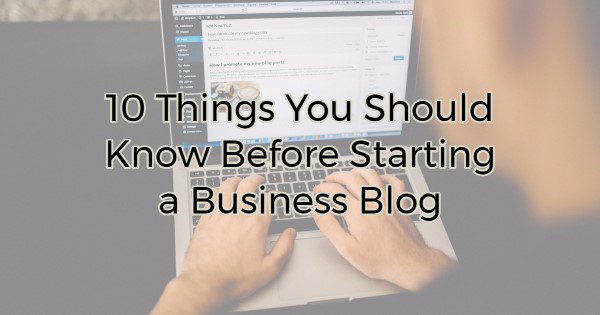10 Things You Should Know Before Starting a Business Blog
It’s probably no surprise that a business blog done well can be a lot of work. You need to post consistently about things your audience cares about. That means committing to it and it may even take research on some of your topics. A valuable blog is time-consuming.
But it takes more than time. If you’re considering a business blog, there are a few things you need to know before you get started.
Who Is Your Audience?
Most business blogs make the mistake of throwing punches in the dark. They simply write about what moves them in any given day. The problem with this strategy is that you waste a lot of time trying things that might not work. Occasionally you’ll hit on something that does, but since you’re not being strategic about your approach, you’re just as likely to revert to things that don’t work as you are to figure out what does.
Knowing who you want to target and who makes a great customer for you is the easiest, most straightforward way to know whether your content is registering. It also helps you come up with content ideas because you know who you’re producing for and what they’re struggling with.
The Format
Do your research to see what format best fits for the type of blog you want to do and what your audience appreciates. Know that you are not hemmed in by words. You can easily produce a vlog (video blog) or a podcast as your blog. Nor do you have to choose. The president of our little league organization communicates to members via video and Facebook Live as well as written emails. His audience members are split on how we like to receive communication so he does it all.
Figure out your audience preferences as to the type of blogs they’ll respond to and then publish in that manner.
The Tech
WordPress is the most common for business but some people use Medium, Blogger, LinkedIn’s Pulse, or Tumblr. If you’re blogging for business, you want to make sure you own the site on which you’re placing your content. Sites like LinkedIn and Medium could change their focus tomorrow and your content could disappear with no warning or options to continue.
Consider a self-hosted WordPress blog or something you have created on your own site. That way you’re backing up your content and have the freedom to do what you want, when you want; no concerns with relying on someone else’s site.
SEO
You needn’t be an SEO expert but you do need to know a few things. Back in the beginning of the wild Internet west, you could repeat your keyword over and over again and rank well. When search engines became more sophisticated, people began hiding keywords in font and color you couldn’t see. Google wised up quickly.
Now you must write (or produce) for your ideal audience and search engines. To forget one is a disservice to the other. Search engines also consider shares and interaction users give your content.
Personalization
The most valuable content will inspire, educate, and/or entertain. Don’t write just to write. Create content your ideal audience or niche will find valuable.
Miscellaneous
Here are a few additional things to keep in mind when starting your blog:
- Building an audience on social channels at the same time (or before) you begin writing a blog will give you a place to share your content amidst people who will value it.
- Copying someone else’s content and dropping it onto your site is plagiarism. It’s better to use short quotes and link back to their article.
- Blogging is not free. It will cost you time. Decide whether your time is worth more than your money. If it is, consider freelancing your content creation.
- A business blog is different than a personal one. You need a content and posting strategy to make the most of your time.
- Blogs are getting longer, but doing what your audience responds to is what matters. Keep an eye on your ideal audience and their preferences. If they want meaty posts—great. Give them what they want. If not, Godin-style short posts may work for you.
Blogging is important. It helps your business rank higher organically and it provides customers with a way to get to know you and have their questions answered. But if you do only one thing in preparation for your business blog make sure you answer…
Who is my audience and what do they need?
Christina R. Green teaches small businesses, chambers, and associations how to connect through content. Her articles have appeared in the Midwest Society of Association Executives’ Magazine, NTEN.org, AssociationTech, and Socialfish. She is a regular blogger at Frankjkenny.com and the Event Manager Blog.
She’s a bookish writer on a quest to bring great storytelling to organizations everywhere.

